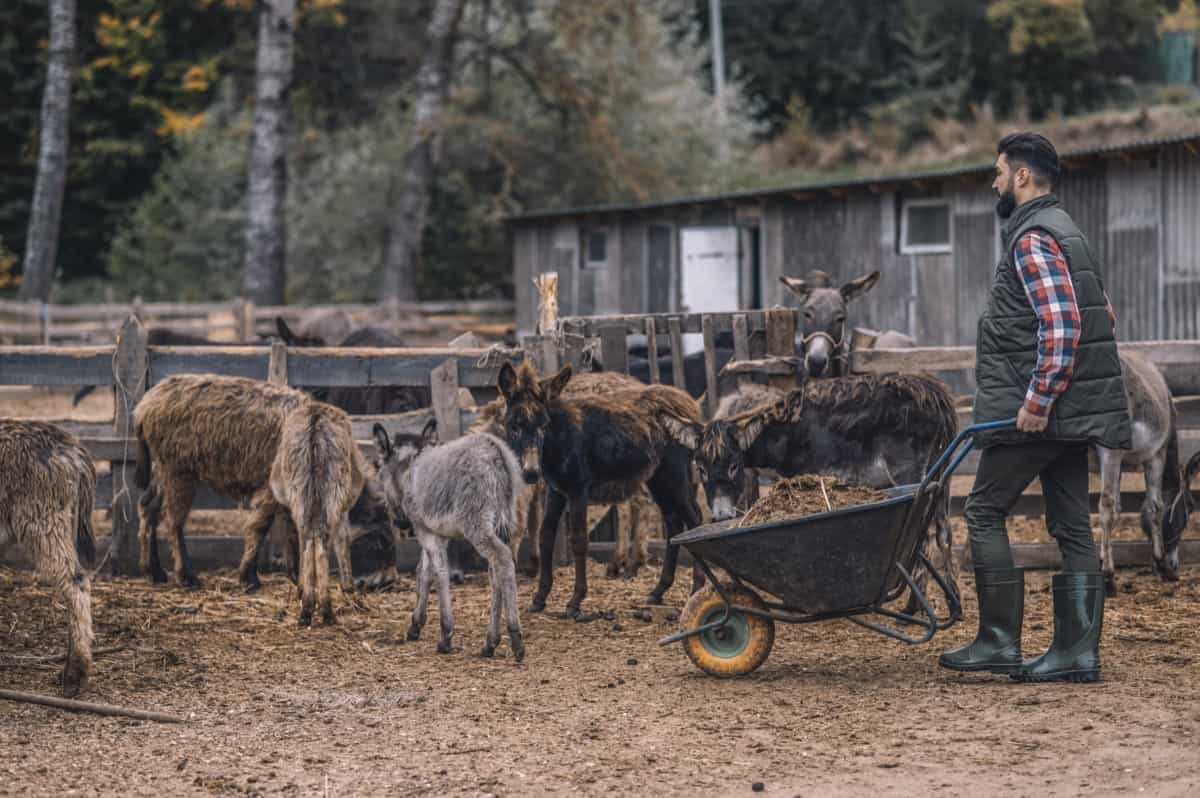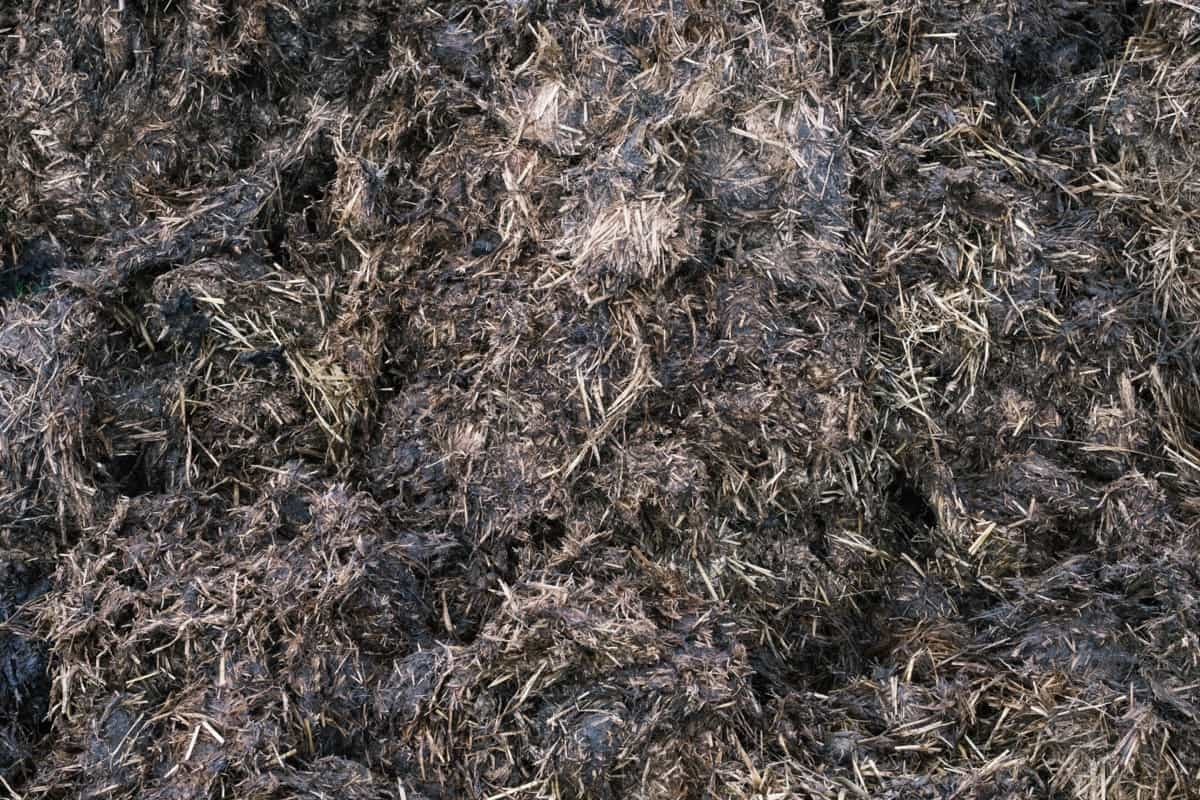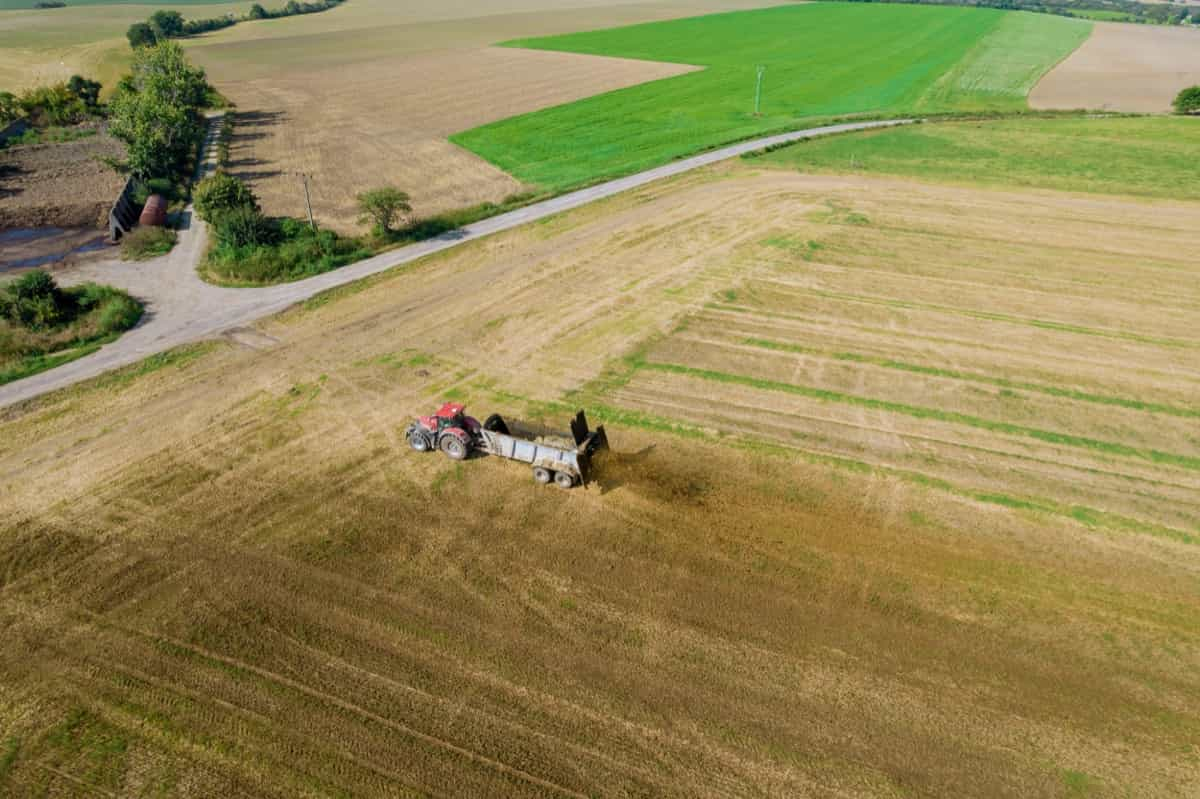In sustainable farming practices, donkey manure has emerged as a hidden gem, offering many advantages to enhance agricultural productivity. Its rich nutrient composition, organic nature, and remarkable soil-enhancing qualities make it an invaluable resource for farmers worldwide. In this blog, we delve into the top 10 benefits that make donkey manure a game-changer in agriculture. From promoting soil fertility and structure to minimizing environmental impact, join us on this enlightening journey as we uncover the immense value of this humble animal’s waste.

What is Donkey Manure in Agriculture?
Donkey manure is an excellent organic fertilizer for gardens and landscapes, providing essential nutrients and minerals for healthy plant growth. It is high in nitrogen, phosphorus, and potassium, essential nutrients for plant growth, and contains trace minerals that boost plant health. Donkey manure is environmentally friendly, improves soil structure and porosity, reduces crop pests and diseases, and is relatively low in odor when compared with other animal manures. It can be applied fresh or composted and can be applied at a rate of about 3 pounds per 100 square feet of garden area. Donkey manure is a valuable fertilizer for vegetable gardens that increases vegetable yield and promotes healthier soil.
It can be applied fresh or composted and can be applied at a rate of 2-3 pounds per 100 square feet of garden area. Donkey manure is a valuable fertilizer for vegetable gardens that increases vegetable yield and promotes healthier soil. Proper application methods can help use donkey manure to fertilize your garden and produce better quality vegetables. When using donkey manure in conjunction with other organic fertilizers, it is essential to apply it at the correct stage of plant growth to avoid burning young seedlings or over-fertilizing mature crops.
Proper application methods can help use donkey manure tp produce better quality vegetables. Mixing donkey manure with other organic materials before spreading it onto the garden bed can minimize damage from nitrogen overload and at the same time provides the all necessary nutrients for healthy plant growth. Donkey manure is versatile and effective for various vegetables, including tomatoes, potatoes, carrots, onions, bell peppers, cucumbers, squash, eggplant, and radishes.
It also enriches soil with vital nutrients like nitrogen, phosphorus, and potassium, boosting plant growth and reducing pests’ ability to damage leaves and produce. Donkey manure is ideal for growing healthy pepper plants, as it contains lower levels of salt and improves soil structure. Regular application of donkey manure ensures larger yields from peppers and eggplants.
10 Best Benefits of Donkey Manure in Agriculture
Nutrient-Rich Organic Fertilizer
- Donkey manure is a nutrient-rich organic fertilizer that provides essential plant growth and development elements.
- It contains significant amounts of nitrogen, phosphorus, and potassium (NPK), vital nutrients for healthy plant growth.
- The balanced nutrient composition of donkey manure promotes optimal nutrient uptake by plants, resulting in improved yields.
- Additionally, it contains essential micronutrients such as calcium, magnesium, and iron, which are crucial for overall plant health.
- The organic matter in donkey manure enhances soil fertility, improves soil structure, and enhances water-holding capacity.
- By using donkey manure as a fertilizer, farmers reduce reliance on synthetic fertilizers, minimizing environmental impact and promoting sustainable agricultural practices.
- The slow-release nature of the nutrients in donkey manure ensures a steady and prolonged supply of nutrients to plants, reducing the risk of nutrient leaching.
- Incorporating donkey manure into the soil boosts microbial activity, supporting beneficial soil organisms that aid nutrient cycling and improve soil health.
- Using nutrient-rich donkey manure in agriculture leads to healthier plants, increased crop yields, and long-term soil fertility, contributing to sustainable and eco-friendly farming systems.
Enhanced Plant Growth by Using Donkey Manure
Donkey manure enhances plant growth by supplying vital nutrients like nitrogen, phosphorus, and potassium. These nutrients stimulate lush foliage, robust root systems, and improved resilience against stress and diseases. The organic matter in the manure improves soil structure, facilitating better root development and nutrient uptake. Donkey manure promotes healthy and productive plants by providing a balanced nutrient composition, increasing crop yields, and improving quality.
Soil Fertility Improvement with Donkey Manure
Donkey manure is an essential agricultural fertilizer due to its nutrient-rich composition, which promotes plant growth and development. It enhances soil fertility, improves soil structure, and increases microbial activity, leading to healthier plants, increased crop yields, and sustainable agricultural practices.
Donkey manure acts as a slow-release fertilizer, providing a steady supply of nutrients to plants, ensuring long-term health and productivity. Donkey manure in farming systems ensures long-term sustainability and promotes healthy, productive soils, contributing to sustainable agriculture.
In case you missed it: Frequently Asked Questions About Donkey Farming

Sustainable Farming Practices with Donkey Manure
- Donkey manure plays a major role in sustainable farming practices by promoting soil health and minimizing environmental impact.
- It’s organic nature and nutrient-rich composition make it an excellent alternative to synthetic fertilizers, reducing chemical inputs and soil degradation.
- Donkey manure improves soil structure, water retention, and nutrient availability, enhancing plant growth and resilience.
- Farmers can reduce transportation costs and support the local economy using locally sourced donkey manure.
- Donkey manure in agriculture helps close the nutrient cycle, fostering a more sustainable and resilient food production system.
Improved Water Retention by Donkey Manure
Donkey manure improves water retention in agricultural soils by enhancing soil structure and increasing pore spaces. This allows for better water infiltration, reduces runoff, and enhances plant water absorption. The increased water-holding capacity helps mitigate drought stress and prevents soil erosion. Donkey manure promotes a healthy balance between water availability and drainage, benefiting crop growth and soil health. This sustainable water management practice reduces the need for excessive irrigation, making it an invaluable asset in agriculture.
Organic Farming Benefits of Donkey Manure
Donkey manure is a natural and organic nutrient source that benefits organic farming by reducing synthetic fertilizers and pesticides. It enriches the soil, promotes balanced fertility, and enhances soil structure, moisture retention, and microbial activity. It suppresses weeds, reduces chemical weed control, and improves soil health, resulting in higher nutrient content and quality. Organic farmers contribute to sustainable agriculture, support biodiversity, and provide a renewable, cost-effective alternative to synthetic inputs.
Control of Soil Erosion by Donkey Manure in Agriculture
Donkey manure significantly controls soil erosion in agriculture by improving soil structure, preventing wind and water erosion, acting as a protective layer, enhancing soil water-holding capacity, promoting vegetation growth, and retaining topsoil. It supports sustainable land management practices and mitigates the environmental impacts of erosion.
Microbial Activity Enhancement by Donkey Manure
Donkey manure is essential for controlling microbial activity and enhancing soil health. It contains beneficial microorganisms, suppressing harmful pathogens and pests, creating a balanced ecosystem, and providing organic matter for microbes. This enhances nutrient cycling, decomposition, and soil structure, contributing to overall stability and resilience. Donkey manure supports sustainable agriculture practices and a healthy soil environment.
Reduced Chemical Pollution
Donkey manure is a sustainable solution for reducing chemical pollution in agriculture by using it as an organic fertilizer. This reduces the need for synthetic chemicals, reducing water and soil contamination risks. Donkey manure enriches the soil with natural nutrients, promoting healthier plant growth without negative environmental impacts. Its organic composition supports beneficial microbial activity, fostering a balanced ecosystem and reducing reliance on chemical interventions. Donkey manure in agricultural practices contributes to a cleaner environment and sustainable food production.
In case you missed it: How to Start Donkey Farming in 10 Steps: Business Plan, Management, and Care

Cost-effective Alternative
Donkey manure is a cost-effective organic fertilizer option for farmers. Other animal manures like cows, horses, or chickens can be substituted. Cow manure is affordable and widely available, while horse manure offers balanced nutrient composition. Chicken manure is rich in nitrogen and can boost soil fertility. Composted kitchen scraps and plant residues can also be used as low-cost alternatives.
Conclusion
The top benefits of donkey manure in agriculture highlight its role in promoting soil fertility, enhancing plant growth, minimizing environmental impact, and supporting sustainable farming practices. Harnessing the power of this organic resource brings significant advantages to the world of agriculture.
- Ultimate Guide to Ossabaw Island Hog: Breeding, Raising, Diet, and Care
- Ultimate Guide to Juliana Pig: Raising Facts, Size, Diet, Care, and Lifespan
- Raising Lleyn Sheep: Disadvantages, Price, Uses, Characteristics, and Care
- Ultimate Guide to Meishan Pig: Breed Facts, Breeding, Raising, and Care
- Ultimate Guide to Teacup Pigs: Raising, Diet, Lifespan, Cost, and Care
- Guide to Raising Poll Dorset Sheep: Facts, Profile, Characteristics, Uses, and Care
- Ultimate Guide to Bighorn Sheep: Characteristics, Diet, Lifespan, Breeding, and Lifecycle
- Ultimate Guide to Raising Katahdin Sheep: Farming Facts, Breed Profile, Uses, and Care
- Ultimate Guide to Raising Oreo Cows: Belted Galloways Farming Facts, Profile, Uses, and Care